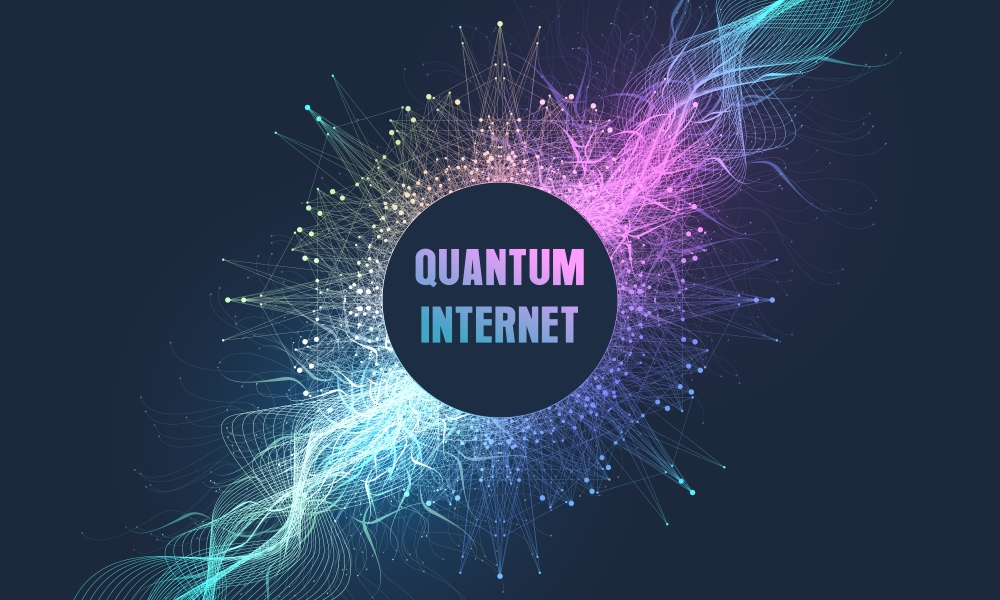The internet has transformed the world, but the next leap in connectivity is already on the horizon-the Quantum Internet. Unlike today’s traditional internet, which relies on classical computing and data transmission, the quantum internet uses the principles of quantum mechanics to enable faster, more secure, and more powerful communications. It promises to change not just how we browse, stream, and connect, but also how industries like healthcare, banking, and science operate.
In this blog, we’ll explore what the quantum internet is, why it matters, how it works, and the impact it could have on the future of technology.

What is the Quantum Internet?
The quantum internet is a next-generation network that uses quantum bits (qubits) instead of classical bits (0s and 1s) to transmit information. Qubits can exist in multiple states at once (thanks to superposition) and can be linked together even at great distances (via entanglement).
This unique property makes communication:
- Ultra-secure – Any attempt to intercept quantum data disrupts its state, making eavesdropping impossible.
- Extremely fast – Quantum data transfer happens at speeds impossible for classical systems.
- More powerful – Supports computations and simulations beyond the reach of classical computers.
How Does It Work?
The quantum internet leverages a few key principles:
- Quantum Entanglement
- When two particles are entangled, the state of one instantly affects the other, no matter the distance. This allows information to be shared securely over vast distances.
- Quantum Teleportation
- Data isn’t physically transmitted-it’s “teleported” using entangled particles, which makes hacking almost impossible.
- Quantum Key Distribution (QKD)
- Ensures that encryption keys used for secure communication cannot be intercepted or copied without detection.
Applications
The potential of the quantum internet goes far beyond faster downloads or streaming. Its biggest impact will be in fields that require security, precision, and computational power:
- Cybersecurity: Unhackable communication channels for governments, businesses, and individuals.
- Healthcare: Secure sharing of sensitive patient data across borders.
- Finance: Ultra-secure transactions and fraud-proof banking systems.
- Scientific Research: Collaborative experiments with massive data sets, like climate modeling or space exploration.
- Artificial Intelligence: Faster training of complex AI models using quantum-enhanced cloud computing.
Current Progress
While the quantum internet is still in its early stages, progress is happening fast:
- China launched the world’s first quantum satellite, Micius, in 2016, demonstrating long-distance quantum key distribution.
- The U.S. Department of Energy has outlined a blueprint for building a quantum internet within the next decade.
- Europe and Japan are heavily investing in research to build quantum networks connecting universities, labs, and businesses.
Several tech companies like IBM, Google, and Microsoft are also racing to build quantum computers and link them to future quantum networks.
Challenges Ahead
Despite the promise, the quantum internet faces significant hurdles:
- Infrastructure: Building quantum repeaters and networks is extremely complex and costly.
- Scalability: Expanding quantum connections from labs to global networks is still a work in progress.
- Stability: Qubits are fragile and can lose information quickly (a problem known as decoherence).
- Accessibility: Making quantum technology affordable for everyday users will take time.
The Future of Connectivity
Experts predict that within the next 10–20 years, the quantum internet will be integrated with our existing networks, creating a hybrid model where classical and quantum systems work together. This won’t just be an upgrade to the current internet-it will be a completely new way of connecting, enabling breakthroughs in areas from medicine to space exploration.
The quantum internet could also give rise to global quantum clouds, where quantum computers across the world are linked to provide unimaginable computational power to industries, researchers, and innovators.
Conclusion
The quantum internet represents more than just faster connectivity-it’s a revolution in how we share information securely, process massive data, and collaborate across the globe. Although the technology is still developing, the progress being made is proof that the future of connectivity lies in quantum mechanics.
As the quantum internet moves from theory to reality, it has the potential to redefine digital life, giving humanity tools for innovation and security at a level never seen before. The internet we know today changed the world once-but the quantum internet could change it forever.
Also Check Artificial Intelligence in Daily Life – Free Guide – 2025




1 thought on “Quantum Internet – The next Big Revolution – 2025”